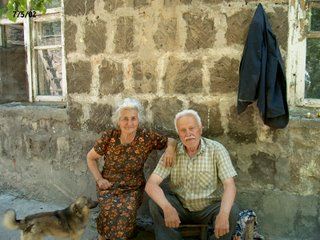Thursday, June 19, 2008
Luck, the boat, and prosperity
My grandmother's other sister Sara, the oldest child of the five, stayed behind to take care of their mother who had been widowed. She left Turkey and lived in the general area of Lebanon north of Beirut with a husband and a couple of children. One day after WW2 a ship comes to the area from the USSR, offering Armenians in the area an opportunity to help rebuild Soviet Armenia. Sara, her husband and son take the opportunity and move to a village about twenty miles outside of Yerevan. (Sara's daughter stayed behind because she was married to a local Arab -- at last report she lives in Syria but we have no contact.)
Once there contact with Sara's two sisters was infrequent, ending with a postcard written in 1980. More than twenty years later I took the postcard to Armenia -- no longer Soviet -- to see if I could find the descendants. Indeed the son, Movses, was still alive, at that point more than 80 years old. The house they lived in had two large rooms and was the house he had built in 1948 with his father. His parents were buried about a mile away. The family lived on a fairly meager income supplemented by kids remitting from abroad (both, by the way, also in construction. I got none of these genes.) This picture shows Movses and his wife outside their home.

I was reminded of this reading Russ Roberts' description of motivation for his new book, The Price of Everything.
When I visited Movses, his oldest son's fondest wish was to travel to Moscow to see how it looked now after transition (I took it he had been there before, but I do not know this.) Of course that trip was cheap if you could get permission to travel while the Soviet Union existed. Now it was not cheap, and sometimes being Armenian in Moscow is a little difficult. In contrast I had been able to travel to many capitals around the world and lived a very different life. Not only because Nana got on that boat to Piraeus and eventually Ellis Island, but for the statue she saw when she got there and what it represented.The novel is the story of Ramon Fernandez, a Cuban-American tennis prodigy who finds himself in the middle of a campus protest at Stanford. ...
Ramon is the son of a legendary Cuban baseball star. After the death of his father, Ramon's mother comes with him to the United States, bringing the young boy to America.
And while the story is fiction, I was inspired by the Elian Gonzalez story. What would have happened to Elian if he had stayed in America. Would he have prospered? Would he have been torn between an allegiance to his new country and his father's Cuba?
A number of pundits at the time of Elian's return to Cuba talked about how he was lucky not to grow up in such a materialist society as America's. I try and explore this issue in the book as well.
Word comes from out of Cuba, that the real Elian Gonzalez has joined Cuba's Young Communist Union.









